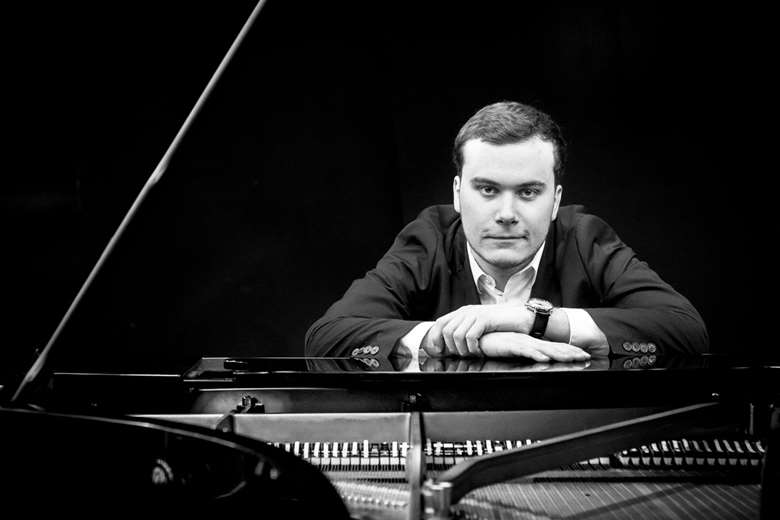Taking Off: Matyas Gayer
Peter Vacher
Thursday, February 20, 2025
Peter Vacher speaks to Hungarian pianist Matyas Gayer, whose deft mixing of contemporary and ‘trad’ strands of jazz is gaining him attention and plaudits

“I love Matyas’ piano playing. He’s passionate about the jazz tradition and is informed by tasteful, delicate players like Tommy Flanagan and Hank Jones, while also having absorbed more modern influences.”
Not my words, but those of altoist Sam Braysher, whose quartet is graced by the Hungarian-born pianist. And it’s not just musicians who applaud Gayer’s piano playing, but commentators too. Chris Pearson in The Times wrote of his "distinctive approach" and the BBC’s Peter Pallai said, "this young man’s a potential star of the piano". Having observed this star quality at close quarters myself at gigs, this cascade of praise suggested a need to find out more about Hungarian-in-London Gayer and his playing philosophy.
“I’m definitely strongly influenced by the mainstream world – but I’m staying really open," he says. "I think that’s key to being a good musician. The music is best for me when we really connect on the bandstand and find something extra together.”
Hanging out in NYC was an inspiring experience, musically and personally
This, he says, is what happened on Westbourne Park, his recent Ubuntu Music trio album: “I’m so glad to have done the trio album with Steve (Brown) and Dave (Green), we really found each other musically and personally. I’m proud to be represented by Ubuntu – it has led to many further nice opportunities, ” he adds, smiling.
Now 32, Gayer says: “I was born in Pecs, Hungary; however I grew up in a small city called Nagykanizsa in the southwest part of Hungary, where a lot of countries meet: Croatia, Slovenia, Austria. Everyone in my family loved music and most of us went to music school but I became the only professional musician.”
Family members owned “a really old grand piano which ended up in our house. I started playing on it and fell in love. I studied the Kodály method in the local music school and started classical lessons aged eight.”
So, when and where did he find jazz?
“My father had a jazz musician friend who often played jazz piano in our place," Gayer explains. "I really enjoyed his performances and started taking private lessons from him at the age of 10. He ran a local club where I began playing live in a band every Friday from my early teenage years. I fell in love with improvising and soon knew this is what I wanted to do.”
Duly inspired, and with high school done, Gayer moved to Graz in Austria to study jazz piano at the University of Music and Performing Arts, one of the oldest and most prestigious institutions in Europe, and spent the next four years working on his Bachelor’s degree.
“It was an amazing experience and I had amazing teachers,” he says, “with a lot of top class professors like Jim Rotondi and Dena DeRose and visiting masters like Benny Golson, David Hazeltine, Fred Hersch, Curtis Fuller. It was very multicultural, buzzing and fantastic. I was so fortunate.
“After Graz, I did my Masters’ degree at the Music and Arts Private University in Vienna, where I spent two years. It was great and I got familiar with life in a bigger city.”
Like many of his generation of apprentice jazz players, Gayer spent time in New York, making three trips, and is still in awe.
“An inspiring experience too, musically and personally, hanging out in the West Village at all the clubs, but mostly in Smalls, Mezzrow and Arturo’s," he elaborates. "Every night for two months, seeing all the great New York pianists.”
Lest it be thought that Hungary was a jazz backwater, Matyas points out that his home town, “had several jazz festivals and concerts every year, which included people like Teddy Wilson, Joe Henderson and Ray Brown and many more. I was lucky to be performing in Hungary and in the neighbouring countries in my teenage years with older, more experienced musicians which was key to my development.”
Matyas opted to move to Britain some five years ago: “I was 26, no family but a few close Hungarian friends here. I always liked London and had performed here first when I was 18 at the Hungarian Cultural Centre.
"I had good connections through them which helped me a lot moving here. The reception was really warm: I think it’s a friendly and supportive music scene here. However the size of the city was shocking in the beginning and I needed to get used to that.”
Playing at Ronnie’s gave him a showcase and a way to meet people and he soon "started to be busy really quickly". In fact his credits read like a modern mainstreamer’s address book: gigs with Braysher, with Nat Steele, and now with Dave O’Higgins’ new sextet, plus dates with visiting US stars like Eddie Henderson and Don Braden at Pizza Express and doubtless more to come.
He’s lately been involved with fellow-pianist Liam Dunachie in co-curating a series of performances at Brown’s Hotel in Mayfair, London.
“It’s a fantastic opportunity to give work to our amazing musician colleagues and friends in a lovely setting,” he smiles.
Serious about jazz but still intent on having fun, Matyas radiates optimism about the music’s future and his own: “I’m proudest when musicians and the audience are happy after my gigs,” he asserts.